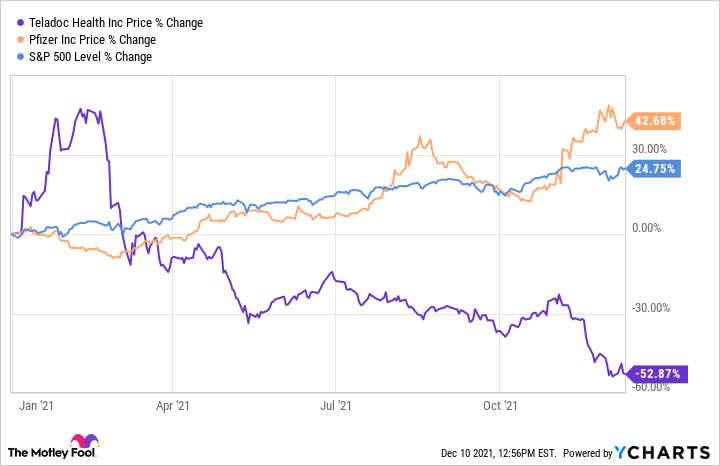Some life choices are hard to make, but investing in stocks is a pretty easy decision for those who can afford it. After all, the stock market remains one of the best ways to grow your capital over time. And among the hundreds of options available on the market, some companies are almost too good to pass up.
Let's discuss two healthcare stocks every investor should strongly consider adding to their portfolio: Teladoc (TDOC -1.52%) and Pfizer (PFE 2.40%). Here's why both companies look so attractive right now.
1. Teladoc
Convenience is a great selling point, and that's why successful businesses are often built around making the lives of their customers easier and more convenient. Teladoc's specialty, which is telehealth, falls squarely in this category. Why drive several miles to have a consultation with a physician when you can do it from the comfort of your home, at any time of the day, and on any day of the week? The benefits of telehealth go beyond the convenience it offers, however.
Last year, a study found that telemedicine saves patients between $19 and $121 per visit. This seems like a small amount, but it can add up to a substantial sum over time. Meanwhile, there is evidence that this innovative method of delivering some traditional healthcare services, including consultations, prescriptions, and referrals, can improve access and quality of care, especially in rural areas.
These benefits don't whisper that telemedicine is here to stay: They scream it. Teladoc is one of the best companies to profit from this opportunity. Thanks to its network of more than 50,000 clinicians and more than 450 sub-specialties, few telemedicine providers can compete with Teladoc.
Here's why this matters: Teladoc's medicine arguably benefits from the network effect -- that is when the value of a service increases as more people use it. The more physicians join Teladoc's network, the more attractive it becomes to patients. As more patients join, this in turn, also makes the network more attractive to physicians.

Image source: Getty Images.
The network effect is a potent competitive edge. It will allow Teladoc to keep most of its competitors at bay and remain a leader in this industry. The company recorded 3.9 million visits in the third quarter, 37% higher than the prior-year quarter. By comparison, American Well Corp, another big player in the telemedicine industry, had 1.4 million visits in the third quarter, compared to the 1.3 million visits it recorded during the third quarter of 2020.
Teladoc is currently unprofitable, reporting a net loss of $812 million for the trailing-12-month period. Net loss aside, the company's edge and increasing visits could provide the tools necessary for its pathway to profitability.
Furthermore, in September, Teladoc was ranked first among direct-to-consumer providers in a telehealth satisfaction study conducted by data analytics company J.D. Power. Teladoc has half its value in the past year, but given the company's position in its industry -- and the growth prospects of said industry -- Teladoc's recent woes on the market only make its shares more attractive. Investors would do well to scoop up its shares before they soar.
2. Pfizer
Over the past couple of years, Pfizer made several moves that have transformed the company into a significantly more attractive investment. First, it shed both its consumer health and off-patent medicine units, creating a business laser-focused on its biopharma operations. Both of these segments were harming Pfizer's bottom line, and the company's pharmaceutical unit was always the better-performing one.
Second, Pfizer shrewdly decided to partner up with BioNTech to develop a coronavirus vaccine called Comirnaty. This vaccine is now the single best-selling pharmaceutical product in the world -- it will generate roughly $36 billion in sales this year. Thanks to Comirnaty, Pfizer's free cash flow has improved substantially recently. It rose by 151.4% to $29.2 billion during the trailing-12-month period.
Pfizer's management team could decide to reward shareholders in several ways with this much cash. Those ways include higher dividend payouts, and of course, they could decide to go out and acquire promising pipeline programs from smaller companies. In other words, Pfizer is in an excellent position to build for the future thanks to the windfall it experienced through the commercialization of Comirnaty.

Image source: Getty Images.
And that's before we get into the company's existing business. Its current lineup features several blockbuster medicines. These include anticoagulant Eliquis, whose sales during the third quarter increased by 21% to $1.3 billion. Other top performers for Pfizer include cancer drugs Xtandi and Inlyta, as well as the company's biosimilar business. Pfizer also boasts a solid lineup with dozens of ongoing clinical programs.
One of the more promising of the bunch is Paxlovid, an investigational treatment for COVID-19. Pfizer completed an application to the U.S. Food and Drug Administration for emergency use authorization for this potential drug in mid-November. There are still thousands of people hospitalized with this disease every week, and while therapy options exist, some of them need to be administered by a healthcare professional. This is the case for Regeneron's REGEN-COV, which is administered by subcutaneous injection.
In a phase 2b/3 clinical trial, Paxlovid reduced the risk of hospitalizations and death in COVID-19 patients by 89%. Last month, Pfizer entered into an agreement to deliver the U.S. government 10 million treatment courses of Paxlovid for a total of $5.3 million. This deal is contingent upon Paxlovid's approval.
Given that the medicine looks likely to hit the market, Pfizer seems to have yet another blockbuster on its hands. With everything the company's got going, one might think its shares have gotten too pricey to touch. Nothing could be further from the truth. With a forward price-to-earnings (P/E) ratio of 12.2, Pfizer looks reasonably valued compared to the average forward P/E of 13.5 in the pharma industry.
Those factors make Pfizer an excellent healthcare stock to add to your portfolio.






